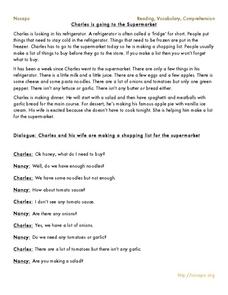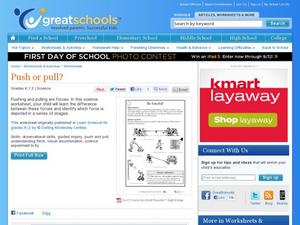Curated OER
Dental Impressions
What an impressive task it is to make dental impressions! Pupils learn how dentists use proportional reasoning, unit conversions, and systems of equations to estimate the materials needed to make stone models of dental impressions....
Chymist
Landfills and Recycling
Examine the nature of landfills through experimentation. Scholars build miniature landfills and monitor changes over a six-week period. Observations allow individuals to draw conclusions about the different types of trash and their...
Nosapo
Reading, Vocabulary, Comprehension
Whether you teach mainstream elementary classes or older English learners, a set of reading comprehension resources is a great addition to your language arts curriculum. Ten activities each include a reading passage and set of...
K5 Learning
Mixed Practice Word Problems #6
Nine questions make up a mixed practice worksheet. The word problems require scholars to show what they know about money, addition, subtraction, multiplication, and division using numbers up to 5,300.
Scholastic
Marijuana: Perception of Harm vs. Use
Many teenagers don't believe that marijuana is harmful, but if they do, it affects whether they use it or not. Analyze the relationship between what high school seniors believe about marijuana and their tendency to use it with a reading...
Worksheet Web
Burrowing Animals – Ground Squirrels
Why do ground squirrels build their homes in the ground? What's so unique about these burrows? Have individuals read about this burrowing animal, and then respond to five short answer questions that assess their comprehension of the...
Curated OER
Observation and Inference
Assess your young scientists' understanding of the difference between observation and inference with this 20-question multiple choice quiz. It reviews a variety of physics and astronomy concepts, such as solar eclipses and sunspots, the...
K12 Reader
World Climates
Why is weather different around the world? Learn about world climates with a reading comprehension passage. Kids read a short passage before answering five comprehension questions based on context clues.
K12 Reader
Where On Earth Are You?
What do we use to determine the exact locations on the earth? Your kids can learn all about compass roses and latitude and longitude. Test understanding with the five reading comprehension questions included on the page.
Read Theory
Analogies 3 (Level 6)
Positive and negative may be opposites, but what does that have to do with the words clean and filthy? Ask your pupils to consider word relationships as they complete the 10 analogies presented here. Note that the exercise gradually...
K5 Learning
The Life Cycle
Studying plant, animal, or insect life cycles? Pair a science unit with a reading comprehension worksheet on life cycles. The passage touches briefly on butterfly, plant, frog, and dog life cycles before prompting readers to answer six...
Royal Society of Chemistry
Lead Compounds: Precipitation Reactions and Pigments—Microscale Chemistry
Colorful lead compounds never fail to impress! Solubility scholars examine a series of double replacement reactions involving lead nitrate and record their observations. The second part of the experiment illustrates the differences...
K12 Reader
Water Carves the Land
What affect do bodies of water have on the world around us? Kids can find out by reading this passage. After reading, they answer five questions related to the text.
K12 Reader
Measuring Temperature
Fahrenheit? Celsius? What's the difference, and where did these two temperature scales originate? Your pupils will learn all about these topics by reading the passage included here. After reading, individuals respond to five questions...
National Institute of Open Schooling
Heavy Metal Contamination
An informative lesson focuses on heavy metal contamination of environments. Classes read about, discuss, and answer questions pertaining to sources of heavy metals in the environment. To finish the 35th installment of 36, individuals...
Curated OER
Experiment Report (Normal Form)
Here is a handy handout to give any science class as a guide to writing lab reports. It is a blank outline that you can have aspiring scientists fill out when they experiment, or imitate as they record their experiments in a lab journal....
Curated OER
Feed Me!
When youngsters are learning about the basic needs of humans and animals, this instructional activity could come in handy. In it, pupils circle the pictures of a living thing that is eating food. There are eight pictures all in all, and...
Curated OER
Food for thought
Cake has to be good for something, right? Different foods are used by our bodies in different ways. Learners will first read about what fats, proteins, fruits, and vegetables do for the human body. They will then put each of food shown...
Curated OER
Mixing Colors
In this science worksheet, students drop food coloring into a glass of water. Students mix different colors to create new colors.
University of Southern California
Wave Erosion Lab
Using a stream table, erosion enthusiasts examine how the density of sediment and how the slope of land contribute to the amount moved by waves. You will not be able to use this entire resource as is; there are teachers' names and...
Curated OER
Keep the Wet Out
After reading a short paragraph about certain materials and their ability to repel water, learners answer two questions regarding a variety of materials' ability to repel water. There are six different substances placed in bowls of...
Curated OER
Battery fun
Conduct an experiment with batteries to make a simple circuit. Fifth graders read the provided information, consider the two circuits, and determine which one is complete. An electrically charged experiment suggestion is included. Tip:...
Clean Up Australia
Why are Batteries Harmful to the Environment?
Open this lesson by reading together about primary and secondary batteries (such as nickel-cadmium cells), problems they can cause in the environment, and how humans can minimize the damage. Afterward, little ones examine a collection of...
Curated OER
Be forceful!
Didn't some scientist develop rules about force and motion? Youngsters can experience physical science as they determine which picture shows the force of pushing or pulling. Tip: Ask learners if they can think of any unseen forces that...
Other popular searches
- What Is Science Important
- What Is Science Worksheets
- Science What Is Science
- What Is Science Fiction
- What Is Science Worhsheets
- What Is a Science Theory
- What Is Science Skills?
- What Is Science Florida
- Science What Is a Rock?























